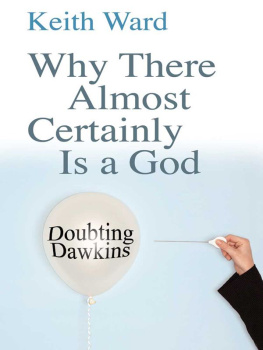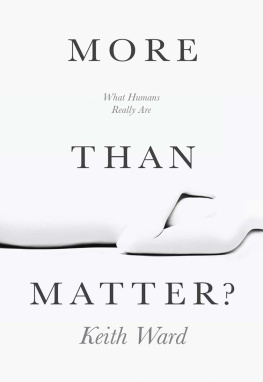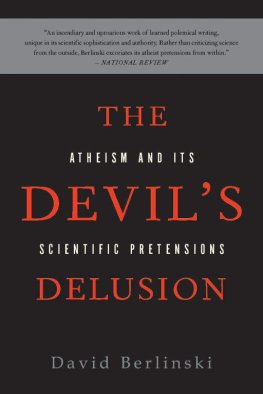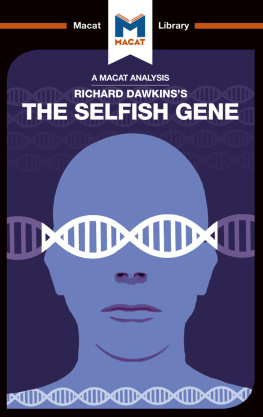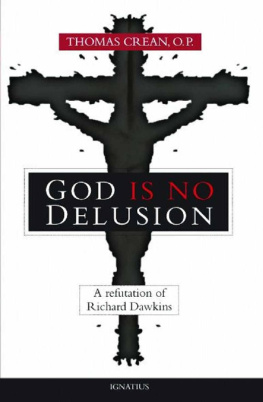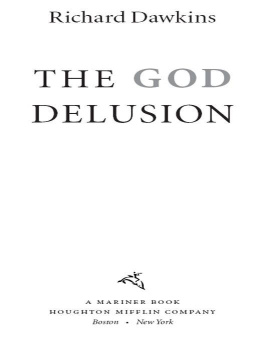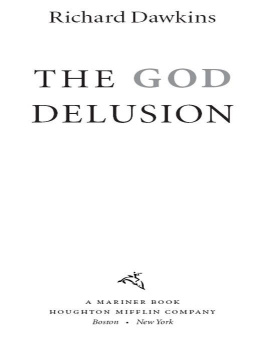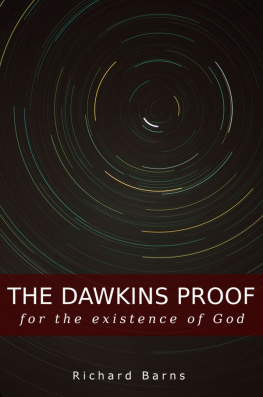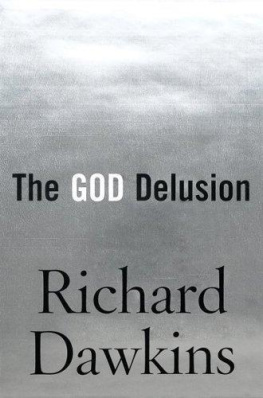Why There
Almost Certainly
Is a God
Doubting Dawkins

Copyright 2008 Keith Ward
The author asserts the moral right to be identified as the author of this work
A Lion Book
an imprint of
Lion Hudson plc
Wilkinson House, Jordan Hill Road,
Oxford OX2 8DR, England
www.lionhudson.com
ISBN 978 0 7459 5330 4 (UK print)
ISBN 978 0 8254 7843 7 (US print)
ISBN 978 0 7459 5921 4 (e-pub)
ISBN 978 0 7459 5920 7 (Kindle)
ISBN 978 0 7459 5932 0 (pdf)
Distributed by:
UK: Marston Book Services, PO Box 269, Abingdon, Oxon, OX14 4YN
USA: Trafalgar Square Publishing, 814 N. Franklin Street, Chicago, IL 60610
USA: Christian Market: Kregel Publications, PO Box 2607, Grand Rapids, Michigan 49501
First edition 2008
10 9 8 7 6 5 4 3
First electronic format 2011
All rights reserved
Acknowledgments
Extracts taken from The God Delusion by Richard Dawkins published in the UK and Commonwealth by Bantam Press, 2006, and in the rest of the world by Mariner Books, 2008. Copyright 2006 Richard Dawkins. Permission for UK and Commonwealth granted by Random House.
Chapters 1 The God Hypothesis, 3 Explaining God Scripture quotations taken from the Holy Bible, New International Version, copyright 1973, 1978, 1984 International Bible Society. Used by permission of Zondervan and Hodder & Stoughton Limited. All rights reserved. The NIV and New International Version trademarks are registered in the United States Patent and Trademark Office by International Bible Society. Use of either trademark requires the permission of International Bible Society. UK trademark number 1448790.
Cover: Corbis
A catalogue record for this book is available from the British Library
Contents
Preface
In 1991, I was happily living as a Professor of Philosophy at Kings College in the University of London when, out of the blue, I received a letter from the office of the Prime Minister, in an official envelope cunningly concealed inside a plain envelope, telling me that the Regius Chair of Divinity at Oxford was vacant, and asking if he could give my name to the Queen. I had not the slightest idea what this meant, and I had to telephone Downing Street to ask how many names the Queen had been given, and what she intended to do with them. It turned out I was being offered the job, and it was an offer I could not refuse.
So I turned up at Oxford, having been transformed by Her Majesty from a philosopher who surprised many people by having some religious beliefs into a theologian who was expected by many people to defend a whole set of religious beliefs as a professional duty. This was a very unexpected change.
When I was a philosopher, and defended belief in God, everyone said, How interesting! That is a very original and unusual opinion. But when I became a theologian, and went on defending the same belief in God, everyone said, How boring! That is just what you are paid to say, so you must be some sort of paid church lackey.
The way I was perceived by other people changed considerably. For some, being a Regius Professor at Oxford (technically, the senior professor in the university) was very grand. But for others, it was a definite slide down the ladder of academic respectability. For from being a free-thinking and radical philosopher, I had suddenly, somewhere on the road from London to Oxford, developed what Richard Dawkins calls a theological mind. And that, he thought, was rather like developing some sort of mental illness.
My arrival in Oxford was heralded by a letter from Richard Dawkins to a public newspaper calling for my resignation, on the ground that there was no such subject as theology, and that I was a particularly stupid example of a theologian anyway.
The reason for his wrath was a short letter I had written to the same newspaper, following a discussion of the Christmas story in the paper. I had written, in what was meant to be a joke, that I knew the three wise men existed because I had seen their tomb in Cologne Cathedral. Admittedly, it was not a very good joke. But it proved too much for Richard Dawkins, who took it as an example of the sort of evidence theologians rely on, and of the best I could do in theological argument.
From that moment, the gloves were off. Even though Dawkins lived and worked in a university with one of the largest and ablest theology faculties in Britain, he went on refusing to admit that there was any such subject as theology. Despite the fact that he and I had entirely friendly and rational personal contacts as he did with Richard Harries, former Bishop of Oxford, and the vicar of the University Church in Oxford, and the chaplain of his college he went on proclaiming that all religious believers were stupid, deluded and dangerous. Despite the fact that many Oxford scientists are Christians, and that there is even a Chair in Science and Religion in the university, he went on saying that science and religion were intellectually incompatible. And despite the fact that a number of us have criticized his views publicly many times, he goes on saying that theologians have never answered his arguments.
In fact there has been a series of public debates in Oxford over the last few years, and I do not think it is obvious that he has won them. They have involved, among others, Richard Dawkins and his even more vituperative atheist colleague Peter Atkins on the one side, and myself, Alister McGrath, Richard Harries and Arthur Peacocke on the other.
In recent years, Alister McGrath, a theologian with a doctorate in molecular biology, and John Lennox, Reader in Mathematics at Oxford, have written excellent books responding to Dawkins arguments. Now it is my turn to rejoin the Oxford God Debate. In a sense, Professor Dawkins got his way I resigned as Regius Professor of Divinity. But I only did so because I reached retirement age, and I am glad to say that I was succeeded by an eminent medieval philosopher, Marilyn McCord Adams. And though resigned, my pugilistic instincts have not subsided, and I am happy to enter the lists in a head-to-head philosophical confrontation. I am even happier to know that I am bound to win, for when Dawkins talks about theology, he is, on his own admission, talking about a subject that does not exist. It is a traditional definition of Oxford scholars that they know everything about nothing (whereas Cambridge scholars know nothing about everything). So Professor Dawkins stands in a good Oxford tradition. But when a subject does not even exist, there is nothing to know about it. I presume, therefore, that Professor Dawkins actually knows nothing about theology. That gives me a head start. Thus I end my Oxford career, as I began it, with a bad joke. Or could it perhaps be true?
Part 1
On Chapter Two of The God Delusion
The God Hypothesis
A Philosophical Challenge Accepted
The title of this book is the title of Chapter 4 of Professor Richard Dawkins best-selling The God Delusion , with one little difference. I have changed the word no to the word a, because I think that change reflects the situation more accurately.
So yes, this is yet another reply to Dawkins by one of those believers in a God whom Dawkins describes as arguably the most unpleasant character in all fiction. My reply will concentrate on Chapters 2 to 4 of Dawkins book, because those are the chapters in which he enters into the territory of philosophy, of arguments about God and the ultimate nature of reality.
That is my territory. I have taught philosophy in British universities all my working life, and I welcome all comers into that world of clear definitions, sharp arguments and diverse conclusions. Professor Dawkins (I will call him simply Dawkins, for short, and hope it will be taken as a mark of respect and of acknowledgment of his status as a household name) is one of the most exciting and informative writers on science, especially on evolutionary biology. I own all his books. I have learned much from them, and have always been greatly impressed by his capacity to convey the awesomeness of modern science and of the universe it explores.

